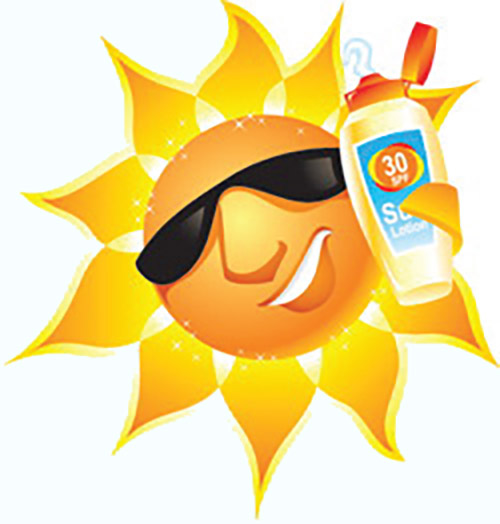

As the summer all too slowly nears, it’s important to review some outdoor safety basics. Number one is sun safety. Playing outside and swimming are always enjoyable experiences for children, but sunburns are not. The sun is strongest between 10 a.m. and 4 p.m. so minimizing sun exposure during these times will help reduce sunburn risk. The American Academy of Pediatrics recommends that all children who will be exposed to the sun wear sunscreen with an SPF factor of at least 15. The benefit of sunscreens with SPFs over 50 is unclear so a good rule of thumb would be SPF 15-50. Infants under 6 months should not be exposed to direct sunlight if possible, but if they are in the sun it is best to cover as much of their skin as possible with tightly woven clothing such as hats, shirts and shorts. Areas that cannot be covered can be treated with small amounts of sunscreen. Sunscreen should be reapplied after 2 hours or after swimming or sweating, and ideally sunscreen should be applied 30 minutes prior to venturing outdoors. UV-impermeable swim shirts are a great choice to protect older children at the pool or on the beach.
Another summertime concern is insect exposure. In the Northeast we have to worry mostly about stinging insects such as wasps and bees, biting insects such as mosquitos and insects that can transmit diseases—again mosquitos, as well as ticks. To decrease the risk of being stung by a wasp avoid dressing children in bright colors or florals and avoid scented products such as soaps, hair sprays and perfumes. If your child is stung and the stinger is still present it can be removed by gently scraping with a hard flat object such as a credit card. The pain can be minimized with ice or cool compresses.
Mosquito bites can be prevented by minimizing any standing water on your property, as that is where the insects tend to breed. The American Academy of Pediatrics recommends insect repellents containing 10-30 percent DEET. Ten percent DEET lasts about two hours, whereas 30 percent lasts about five. An alternative to DEET would be sprays or lotions containing 5-10 percent picaridin. Mosquitoes tend to be most active at dawn and dusk so avoiding being outside at those times can minimize the risk of bites. They can transmit West Nile Virus, which causes mild to no symptoms in most people, but can make young infants or the elderly sick.
Ticks tend to hide in tall grass and forested areas where deer are present. To minimize the risk of a bite that could transmit Lyme Disease wear long pants, long sleeves and socks in these areas. Additionally, insect repellents should be used. If children are outside in the grass or have gone hiking it is a good idea to check their skin at the end of the day for attached ticks. Though sometimes they hide in plain sight, it’s a good idea to check along the hairline, behind the ears, and around the belly button for ticks. If one is found it can be removed by using a pair of tweezers to grab the tick by the proboscis (mouth) where it feeds through the skin and then gently pull straight out. Per the CDC, ticks need to be attached for 36-48 hours before disease transmission occurs so if the tick is removed promptly there is little concern for Lyme disease (even if the tick is not removed in its entirety).
Finally, summer is an excellent time for children to enjoy the outdoors on their bicycles. It is important for bikes to be properly sized—a good rule of thumb is that a child should be able to reach the ground with his or her toes. Bike helmets should be worn at all times, even when riding in a driveway or cul de sac. The helmet should be worn level, and the straps should be snug, but still loose enough that two fingers can fit between the chin and chinstrap. The helmet should be certified by the Consumer Product Safety Commission to ensure quality.
For more information on these and other topics please visit www.AAP.org�or www.healthychildren.org. Wishing everyone an enjoyable, safe and healthy summer!
By Robert Jawetz, MD, Tenafly Pediatrics










